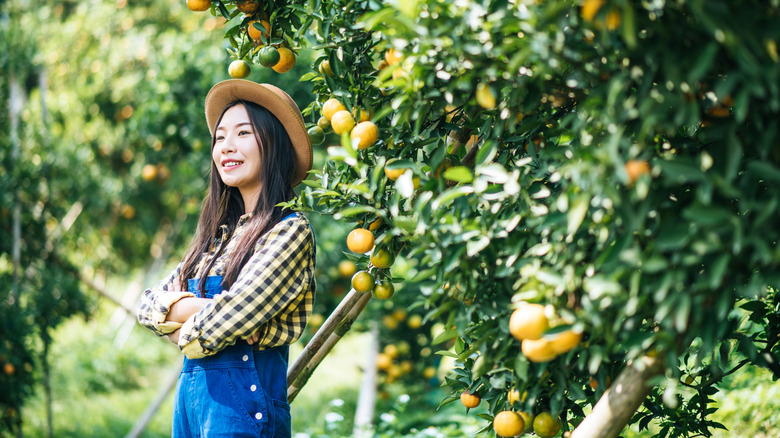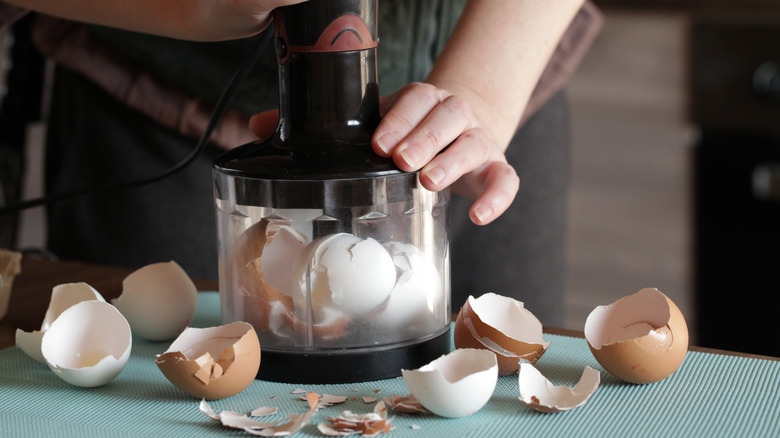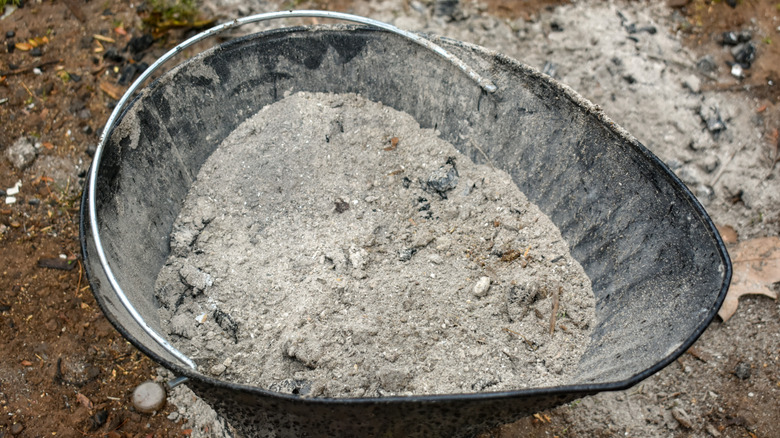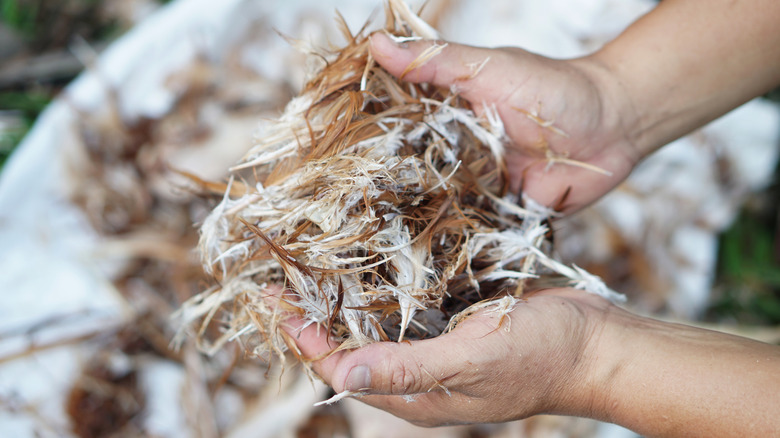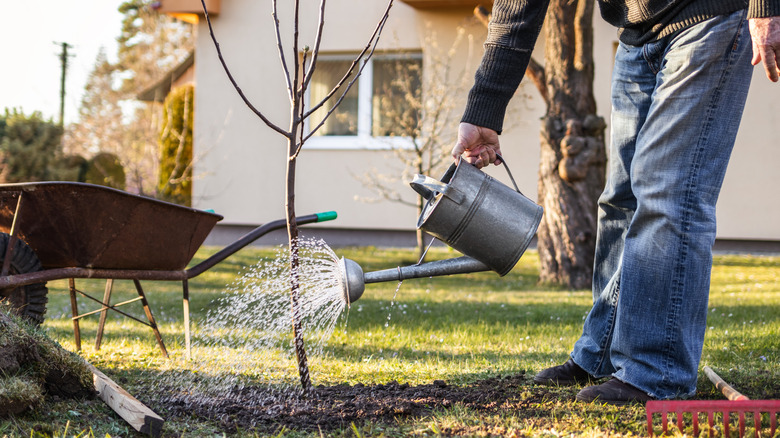The Best Fruit Tree Fertilizers For Natural, Budget-Friendly Support
We may receive a commission on purchases made from links.
Miracle-Gro is a controversial topic among gardeners on TikTok, Reddit, and beyond. That's because this product and similar synthetic fertilizers can hobble helpful microorganisms and decrease soil quality. If these concerns resonate with you, consider a natural alternative for your fruit trees. Many natural fertilizers infuse soil with the three main nutrients fruit trees crave: nitrogen, phosphorous, and potassium. Some provide other nutrients and plant-supporting microorganisms, too. A few budget-friendly options are compost, fruit peels, and wood ash. Bone meal and fish emulsion cost a little more but can boost specific nutrients your fruit trees may need. Knowing the nutrient requirements of your trees, plus the nutrient levels in your soil, can help you decide which natural fertilizer is the best fit for your garden.
Different types of fruit trees have different fertilization needs. No matter what kind of fruit you're growing, measure the soil's nitrogen, phosphorous, and potassium levels annually. Consider testing for other essential nutrients such as calcium, too. A product like the MySoil nutrient and pH test kit can help you assess the levels of more than a dozen nutrients, and so can the soil testing lab at a local cooperative extension office. The information you gain from this test can guide your decision-making as you review your natural fertilizer options.
Raising calcium levels with natural fertilizer
Sometimes fruit trees need a big boost of one nutrient but not much of others. For instance, citrus trees extract a great deal of calcium from soil, so soil testing may reveal that they need more. Calcium-deficient plants may grow slowly, form misshapen leaves, or develop blossom end-rot. If your fruit plants need more calcium, remedy the problem with a natural fertilizer that's rich in this nutrient. Bone meal and crushed oyster shells are two reliable options that can be added to a compost bin or used as mulch. If the fruit tree that needs calcium also needs low-pH soil, proceed with caution since these materials can raise the pH level.
Low-cost DIY eggshell fertilizer can also help calcium-deprived plants get healthy. Soaking eggshells in 5 percent vinegar for about two days can make calcium easier for your fruit trees to extract. Any amount of vinegar will do as long as it produces bubbles when poured on the eggshells. Once the bubbling has subsided, the solution is ready to use. Running the mixture through a blender or straining out the shell pieces can make this homemade fertilizer easier to feed to your plants.
Natural ways to replenish phosphorous and potassium
If a soil test shows that your fruit trees need more phosphorous or potassium, trying a gentle natural fertilizer that contains the needed nutrient is a smart first step. You might also choose this type of fertilizer if your trees are showing signs of deficiency. Phosphorous deficiency can turn leaves dark green or purple, prompt your tree to produce less fruit, and lower the quality of that fruit. A potassium shortage may lead to lagging growth and yellowing foliage. The margins of leaves may also turn brown.
Wood ash is sometimes used to fertilize fruit trees that need more potassium to grow flavorful fruit. If you try it, make sure the ash comes from untreated wood and know that it will raise your soil's pH level. This may not bode well for blueberries and other fruits that detest alkaline conditions. Fruit trees that need more potassium may also benefit from budget-friendly banana peel fertilizer "tea." Just submerge a pile of peels in water for a couple of days and water your fruit trees with the liquid after diluting it. Add five parts of water for every one part of banana peel liquid to achieve the proper nutrient concentration.
Need more phosphorous in the soil surrounding your fruit trees? Try amending your soil with bone meal or alfalfa meal. Earth Science natural bone meal plant food and Espoma organic alfalfa meal fertilizer 2-0-2 are two of your options. Alfalfa meal is an especially good choice because it releases potassium gradually, protecting your fruit trees from shock and scorching.
Fertilizers for boosting your soil's nitrogen content
When growing oranges, pears, or other fruit trees that demand lots of nitrogen, they may show signs of nitrogen deficiency, like yellowing leaves and stunted growth. To resolve this problem, consider a rapid-release natural fertilizer such as fish emulsion. One reliable option is Bloom City organic wild fish fertilizer. You can also make your own fish fertilizer with economical canned tuna. Pour comparable amounts of fish and sawdust into a bucket, add a cup of additive-free molasses, and submerge these materials in water. Cover the bucket with a lid that has air holes, then let its contents sit for two weeks, mixing them once a day. Strain off the liquid and dilute it before feeding it to your fruit trees. Blend a tablespoon of fish fertilizer into a gallon of water, then use this liquid to water nitrogen-craving plants.
If your fruit plants need more nitrogen, but not immediately, mulch around them with grass clippings. Or, leverage the fertilizing power of feathers, which are rich in nitrogen. If you don't have backyard chickens or are concerned about avian diseases such as bird flu, try using the down feathers from an old pillow. You can add them to a compost pile to increase its nitrogen level or make liquid fertilizer by soaking feathers in water for two months. You'll need about two gallons of water for every handful of feathers. As with fish fertilizer, add a small amount of the "tea" you've brewed to a gallon of water before applying it to your fruit trees. This minimizes the risk of burning your plants with concentrated nitrogen.
General-purpose liquid fertilizers you can make at home
Fruit trees often need a balanced blend of nitrogen, phosphorous, and potassium. In this case, compost is a good starting point. Simply spread it around a fruit tree's base once a year. In addition to enhancing the soil's structure and feeding microbes, compost releases nutrients slowly, which can help your trees make fruit. Or, use another organic material that will release nutrients as it breaks down. Apple peels can nourish your garden's fruit trees and other plants. Chop them up and place them around a fruit tree's base with a carbon-rich material such as dried leaves. This method works with watermelon rinds, too.
You can also boost nitrogen, phosphorous, and potassium by making DIY fertilizer tea from plants in your yard. Dandelions are one easy-to-find plant to try. Soak them in a covered bucket for two weeks, using 8 cups of water for every pound of plant matter. At the end of the brewing period, strain off the solids, dilute the liquid with 10 times as much water, and pour it around fruit trees' roots.
Avocados may require more zinc, magnesium, or other substances that most fruit trees need in small quantities. Compost tea is a natural source of many of these nutrients, as well as nitrogen, phosphorous, and potassium. Soak 1 1/2 cups of compost or composted manure in a 5-gallon bucket of water for a week, then dilute the liquid and give it to your fruit trees. Alternatively, you can purchase a product like Planet Earth compost tea liquid organic fertilizer. Since it's a concentrate, water it down by following the instructions on the package.
